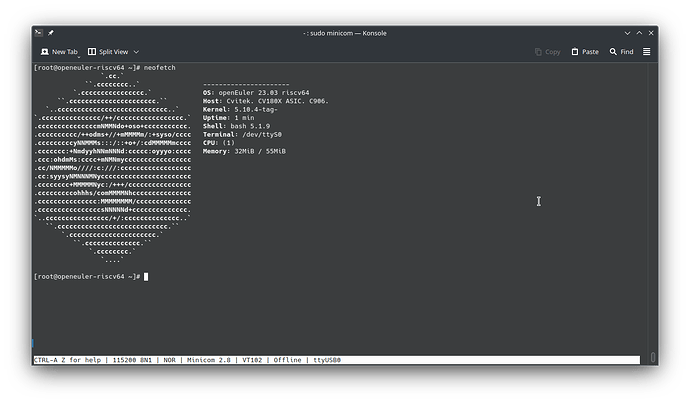I saw some people successfully running Archlinux RISC-V, so it should also work for openEuler RISC-V
The entire process was completed on Archlinux, and the compilation was run in a schroot container with Ubuntu 20.04 LTS. The environment configuration can be referenced from this post.
Building the Image
This part is completed within the Ubuntu 20.04 LTS container.
mkdir somewhere && cd somewhere
git clone https://github.com/milkv-duo/duo-buildroot-sdk.git
cd duo-buildroot-sdk/
Because I am not quite sure about which kernel configurations it depends on, I copied the kernel configuration completely from Milkv-duo Running Arch Linux System.
vim build/boards/cv180x/cv1800b_milkv_duo_sd/linux/cvitek_cv1800b_milkv_duo_sd_defconfig
# for openEuler
CONFIG_CGROUPS=y
CONFIG_CGROUP_FREEZER=y
CONFIG_CGROUP_PIDS=y
CONFIG_CGROUP_DEVICE=y
CONFIG_CPUSETS=y
CONFIG_PROC_PID_CPUSET=y
CONFIG_CGROUP_CPUACCT=y
CONFIG_PAGE_COUNTER=y
CONFIG_MEMCG=y
CONFIG_CGROUP_SCHED=y
CONFIG_NAMESPACES=y
CONFIG_OVERLAY_FS=y
CONFIG_AUTOFS4_FS=y
CONFIG_SIGNALFD=y
CONFIG_TIMERFD=y
CONFIG_EPOLL=y
CONFIG_IPV6=y
CONFIG_FANOTIFY
Since I am not using the camera (and also due to memory constraints), I set ION_SIZE to 0M:
vim build/boards/cv180x/cv1800b_milkv_duo_sd/memmap.py
# line 43
ION_SIZE = 0
Due to the relatively large size of the rootfs for openEuler RISC-V, I increased the size of the root partition of the image.
vim milkv/genimage-milkv-duo.cfg
# line 16
size = 2048M
One-click compilation:
./build_milkv.sh
Finally, you can see the successful compilation log:
Gen image successful: out/milkv-duo-20230815-1447.img
Copy this image out for future use.
Replace the root file system
Exit from the container and copy the image
cp /PATH/TO/CHROOT/duo-buildroot-sdk/out/milkv-duo-20230815-1447.img .
cp milkv-duo-20230815-1447.img milkv-duo-openeuler.img
Check available loopback devices, which is shown as /dev/loop0 in my case
sudo losetup -f
Bind the device
sudo losetup /dev/loop0 milkv-duo-openeuler.img
Load the partition, and you can see two partitions
sudo kpartx -av /dev/loop0
add map loop0p1 (254:0): 0 262144 linear 7:0 1
add map loop0p2 (254:1): 0 4194304 linear 7:0 262145
View the devices, you can see loop0p1 and loop0p2 two partitions, of which loop0p2 is the root partition
ls /dev/mapper/
control loop0p1 loop0p2
Mount
sudo mkdir /mnt/sd
sudo mount /dev/mapper/loop0p2 /mnt/sd
Download oErv 23.03 V1
wget https://mirror.iscas.ac.cn/openeuler-sig-riscv/openEuler-RISC-V/preview/openEuler-23.03-V1-riscv64/openeuler-rootfs.tar.gz
Delete everything
cd /mnt/sd
sudo rm -r ./*
Extract oErv rootfs
tar zxvf /PATH/TO/openeuler-rootfs.tar.gz
Suddenly, the disk space is insufficient. However, after running df -i, I found that this 2G partition only has 4096 inodes, so I have to re-create the ext4 file system and extract again.
Using the same method, I mounted the second partition of the original image to /mnt/sd1, and copied the kernel modules and scripts inside.
sudo cp -r /mnt/sd1/mnt/system /mnt/sd/mnt
sudo cp /mnt/sd1/etc/run_usb.sh /mnt/sd/etc/
sudo cp /mnt/sd1/etc/uhubon.sh /mnt/sd/etc/
sudo cp /mnt/sd1/etc/init.d/S99user /mnt/sd/etc/init.d/
chroot into rootfs (qemu required), run neofetch, and install dhcp
# Enter chroot
sudo cp /etc/resolv.conf /mnt/sd/etc/resolv.conf
chroot /mnt/sd
# Install neofetch
wget https://github.com/dylanaraps/neofetch/raw/master/neofetch
mv neofetch /usr/bin/
chmod +x /usr/bin/neofetch
# Install dhcp for RNDIS
dnf install dhcp
cat <<EOF >> /etc/dhcp/dhcpd.conf
subnet 192.168.42.0 netmask 255.255.255.0 {
option routers 192.168.42.1;
range 192.168.42.100 192.168.42.200;
}
EOF
# systemctl enable dhcpd
Unmount
sudo umount /mnt/sd
sudo kpartx -d /dev/loop0
sudo losetup -d /dev/loop0
oErv is up and running!
Burn the image, pay attention to the image path and target device
dd if=/PATH/TO/milkv-duo-openeuler.img of=/dev/sdX bs=4M status=progress
sync
Serial connection
| Name | Pin |
|---|---|
| TX | 16 |
| RX | 17 |
| GND | 18 |
Since I don’t have header pins at the moment, I connected it directly with DuPont wires to the holes and the USB serial connection. Surprisingly, the connection worked well, and communication is normal.
sudo minicom -D /dev/ttyUSB0
Then, it will boot up! The username is “root,” and the password is “openEuler12#$.”
[root@openeuler-riscv64 ~]# neofetch
`.cc.`
``.cccccccc..` ----------------------
`.cccccccccccccccc.` OS: openEuler 23.03 riscv64
``.cccccccccccccccccccccc.`` Host: Cvitek. CV180X ASIC. C906.
`..cccccccccccccccccccccccccccc..` Kernel: 5.10.4-tag-
`.ccccccccccccccc/++/ccccccccccccccccc.` Uptime: 52 secs
.cccccccccccccccmNMMNdo+oso+ccccccccccc. Shell: bash 5.1.9
.cccccccccc/++odms+//+mMMMMm/:+syso/cccc Terminal: /dev/ttyS0
.cccccccccyNNMMMs:::/::+o+/:cdMMMMMmcccc CPU: (1)
.ccccccc:+NmdyyhNNmNNNd:ccccc:oyyyo:cccc Memory: 33MiB / 55MiB
.ccc:ohdmMs:cccc+mNMNmyccccccccccccccccc
.cc/NMMMMMo////:c:///:cccccccccccccccccc
.cc:syysyNMNNNMNyccccccccccccccccccccccc
.cccccccc+MMMMMNyc:/+++/cccccccccccccccc
.cccccccccohhhs/comMMMMNhccccccccccccccc
.ccccccccccccccc:MMMMMMMM/cccccccccccccc
.ccccccccccccccccsNNNNNd+cccccccccccccc.
`..cccccccccccccccc/+/:cccccccccccccc..`
``.cccccccccccccccccccccccccccc.``
`.cccccccccccccccccccccc.`
``.cccccccccccccc.``
`.cccccccc.`
`....`
[root@openeuler-riscv64 ~]#
Enable UNDIS
systemctl start S99user
systemctl start dhcpd
More work is needed to automatically enable UNDIS, but I’ll write it here for now.
And, there is not enough memory.
To be honest, that SD card is not very friendly, and I almost tore off the LED.
by ISCAS weilinfox
